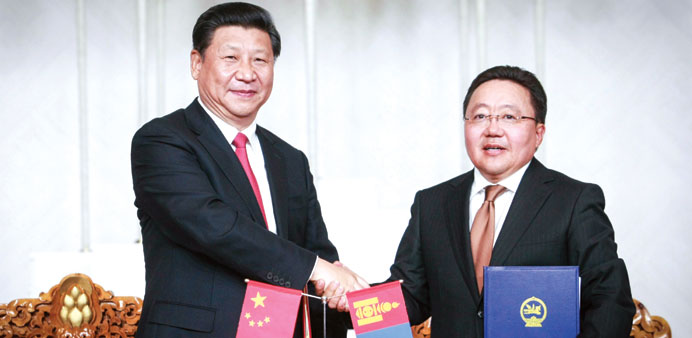Chinese President Xi Jinping (left) shakes hands with Mongolian President Tsakhiagiin Elbegdorj after signing the joint declaration in Ulan Bator yesterday. China is the biggest investor in Mongolia and also the largest market for its huge stocks of coal and copper.
AFP/Ulan Bator
China and Mongolia set out plans to almost double trade to $10bn by 2020 as Chinese President Xi Jinping began a two-day visit to the neighbouring state, Xinhua reported yesterday.
Xi and his Mongolian counterpart, Tsakhiagiin Elbegdorj, signed a joint declaration in Ulan Bator to upgrade ties to a “comprehensive strategic partnership,” China’s official news agency said, without giving further details.
China has also agreed to allow landlocked Mongolia to use its northern seaports, Xinhua said.
Xi is the first Chinese president to visit Mongolia in more than a decade and trade is high on the agenda, despite tensions over the exploitation of Mongolia’s vast natural resources.
Prime Minister Altanhuyag Norov welcomed Xi and his wife Peng Liyuan at Ulan Bator’s international airport, named for the Mongolian conqueror Genghis Khan.
“China and Mongolia are now standing at a new historical point in growing their relations,” Xi said according to Xinhua.
Beijing needs natural resources from abroad to power its economy, the world’s second-largest, and the two countries share an extensive border and skyrocketing commercial links.
China is the biggest investor in Mongolia, and also the largest market for its huge stocks of coal and copper.
Bilateral trade soared to $6bn in 2013 from just $324mn in 2002 and makes up more than half of Mongolia’s total foreign trade, Xinhua said.
But resource nationalism has become the defining issue in Mongolian politics in recent years, with the country in 2012 tightening approval requirements for foreign companies seeking to do business in “strategic” sectors such as minerals.
For decades a tightly controlled Soviet satellite, Mongolia shook off communism nearly a quarter of a century ago and has emerged as a vibrant parliamentary democracy.
In recent years its economy showed impressive growth fuelled by demand for its resources, but expansion has slowed amid falling coal prices and foreign investment.
Shurkuu Dorj, director of the institute of international studies of the Mongolian Academy of Sciences, said Mongolia needs foreign investment and having such a huge economy as China at its doorstep present both opportunities and risks.
“China is offering a chance to Mongolia to develop and grow together,” he told AFP.
“However, at the same time Mongolia has to be very careful not to become too reliant on China,” he added. “So this will be a great challenge for
Mongolia.”
Mongolia’s foreign investment law was enacted after China’s biggest aluminium producer Chalco sought to take a stake in Mongolian company SouthGobi. The move could have seen control of Ovoot Tolgoi, one of the country’s biggest coalmines, fall into Chinese hands.
Mongolia, with a population of about 2.8mn, lies between major powers Russia and China.
Hu Jintao, Xi’s predecessor, was the last Chinese president to visit Mongolia, in 2003.

